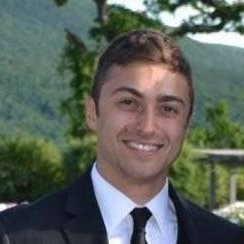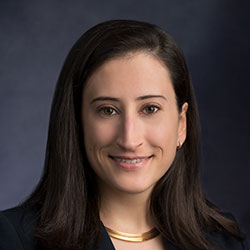Name: Micaela Melley Chiaramonte
Class Year: 2008
Title: Director of Major Gifts and Centennial Celebration
Organization Name: The Nightingale-Bamford School in Manhattan, New York
1. In one sentence, what does your job entail?
Essentially, I work in sales – but it is much more fascinating than typical sales work (i.e. cars, software platforms, etc.) – as I work with individuals’ personal assets and philanthropic donations. When someone makes a philanthropic donation, s/he does not necessarily get anything tangible in return except a warm feeling that s/he has helped enhance the common good. This giving spirit is incredibly empowering to be around. Pre-COVID, I also oversaw affiliated fundraising gala events and was most recently leading a 1,100 person event at The Metropolitan Museum of Art.
2. What planned and unplanned events connected you to your industry and your first employer after Holy Cross? How did you learn/decide it was a good fit for you?
My first two jobs after college were a complete result of the Holy Cross alumni network!
My first job was at a software startup company, then called OpenAir. One of the co-founders was a Holy Cross graduate (Tom Brennan ’86) and he hired many Holy Cross students, with all various majors. He was driven by the notion that with our liberal arts background, we would be able to easily adapt and learn the software industry – and he was right! I worked in their Customer Support and Account Management departments for 4 years and learned so very much about sales and the business industry.
While I enjoyed being in sales, I knew that I wanted to transition to non-profit to explore the area of sales I liked the most – building relationships with clients but in a more meaningful capacity.
I then transitioned to the non-profit world and started working at Harvard University in their Alumni Affairs and Development department. I was introduced to my manager through a Holy Cross alum (the Holy Cross alumni network is amazing and is everywhere – you have to always be ready!) After Harvard, I moved to New York City and worked for The New School for five years and became more focused and specialized in major giving and special events at Parsons School of Design and the College of Performing Arts. I organized fundraising events during fashion week and a Centennial Celebration at Carnegie Hall. I had the unique opportunity to work with a Parsons’ donor who established a scholarship in memory of his late, close friend who was a Holy Cross graduate. It was very special to work with these families in building quite the legacy gift. I then transitioned to The Nightingale-Bamford School, an all-girls K-12 independent school in Manhattan where I have been leading the charge on their endowment campaign and major giving the last three years. My work in the fast-paced event world involves many late nights and weekend work but it is very inspiring and rewarding.
3. What was your major and how did it affect your career decisions?
I double majored in history and Spanish and spent my junior year abroad in Leon, Spain.
The skills I learned from both majors have played a critical role in my career. Being a history major provided me with incredible research and writing skills that I use daily in my role. My Spanish major was influential in helping me build my communication skills, especially listening skills. Most importantly, both majors and studying abroad, provided the foundation in giving me the confidence to ask questions.
4. What are one or two skills that you developed at Holy Cross that you use in your work?
Research and writing skills from being a history major: Before I meet with a donor, I research every possible angle of this individual’s life so I can be prepared to align a solicitation/my organization’s funding priorities to his/her best interests. I am constantly writing – from small emails, to handwritten thank you notes, to complex donor proposals.
Listening skills from being a Spanish major: A huge part of my job is to truly listen to the donor (you would be surprised how many people struggle with mastering this skill!). My Spanish major taught me the importance and taking a step back and truly listening and focusing on what the person is saying.
5. What advice do you have for students on campus today?
Embrace the Holy Cross alumni network; start familiarizing yourself with its resources as early as you can. You are the best advocate for your career. No one is going to help advance your career – you have to take the initiative. Always listen to your gut!











